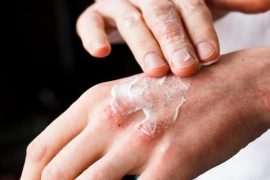Зміст
According to studies, the average person touches the eyes 29 times a day, and the face more than 90 times. Most of us do this completely unconsciously – out of habit or in response to stress. However, you should abandon this habit – this is the main cause of bacterial and viral infections, conjunctivitis or acne. Even with clean hands, we carry dangerous microbes that penetrate deep into the body through the mucous membranes and cause inflammation. How to refrain from touching the face and protect yourself from infectious diseases?
Viral and bacterial infections
We carry thousands of germs on our hands every day. All we need to do is touch the door handle at the entrance to the store or handrail in public transport. Microbes transferred from the phone, money or keys remain in your hands. Fortunately, most bacteria and other microorganisms are not dangerous to us – as a society that we managed to immunize against them. Unfortunately, viruses responsible for serious diseases, such as flu, smallpox, or pneumonia (as in the case of the COVID-19 virus), still pose a great threat. These microorganisms can “hide” on the surfaces of objects or clothing, and then spread to the hands. That’s why touching your face is so dangerous – we can easily transfer the virus to the mucous membranes of the nose and mouth. And from there, they quickly penetrate deep into the body and can cause inflammation.
Facial skin diseases
Frequent touching the face is also one of the causes of acne, allergies and other skin changes. Bacteria transferred to the hands worsen complexion and contribute to subsequent infections. For example, many people develop staphylococcal bacteria on their skin, which are activated only when our immunity decreases or as a result of inadequate hygiene (slightly acidic skin pH reduces the risk of infection). Other skin diseases caused by bacteria include folliculitis and boils, a rose (bacteria cause acute inflammation most often on the face and lower extremities), impetigo (skin changes usually appear around the nose and mouth) or actinomycosis (contributing to its development). Bacteria from the mouth and changes are most often observed on the face and neck. All bacterial skin diseases require antibiotic treatment,
Do not touch the eyes.
Viruses that cause serious infectious diseases (such as the respiratory system) can also enter the body through the eyes. However, bacteria and other microorganisms also pose a threat to the eyes themselves. Their frequent rubbing contributes to the development of conjunctivitis and other diseases. The most dangerous diseases include bacterial, viral, or fungal keratitis. They are most often responsible for streptococci and staphylococci, as well as the herpes virus.
How to protect yourself from infection?
Touching your face is a very difficult habit. Scientists and psychologists say that in this way we express our self-awareness, and this is normal behavior during social interactions. We still do not combine touching the face with the threat of illness. However, the panic caused by the spreading epidemic of coronavirus is prompting more and more people to observe more stringent hygiene rules. To control the habit of constantly touching your face, you should work with your hands, for example, work at the computer or squeeze the ball to relieve stress. It is also important to realize the reasons for touching the face (we often do this from boredom or stress), and then try to control it in this situation. Just knowing the habit will help us fight it. The gradual restriction of your face over time can lead to complete control over it. The risk of infection also reduces frequent and prolonged washing of hands and the use of disinfectants – it is important to use them both for hands and for commonly used items, such as telephones or keys.








